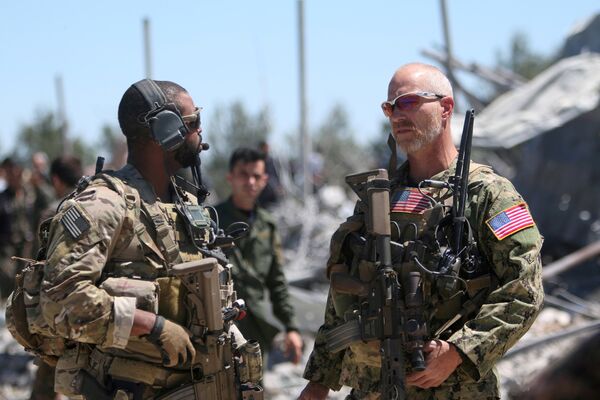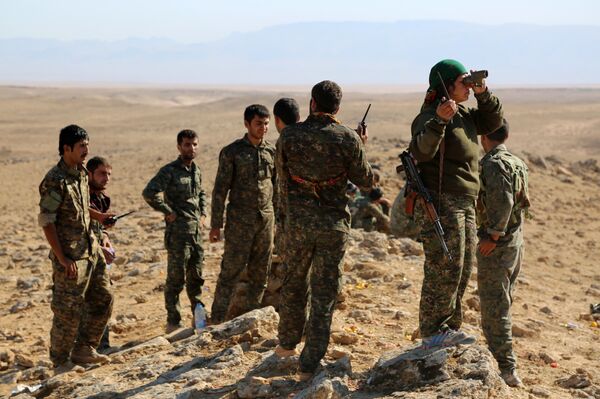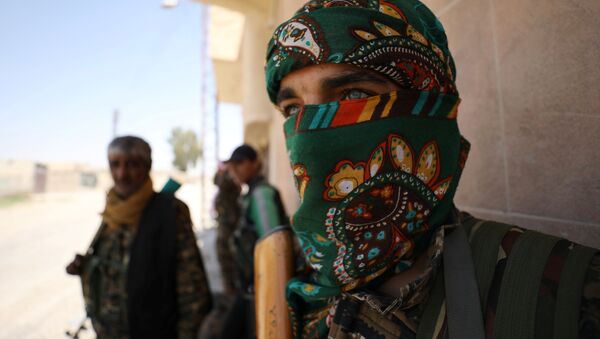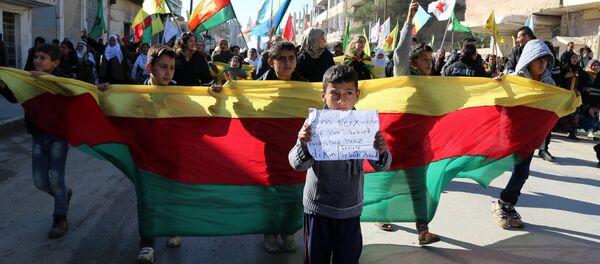On March 17, 2016, the Syrian Kurds proclaimed the creation of the Democratic Federation of Rojava — Northern Syria in northern Syria at a conference in Hasakah Governorate. In December 2016 it was renamed the Democratic Federation of Northern Syria.
However, in the eyes of Damascus, the Kurds' unilateral decisions have no legal power.
In this context, it is likely that the Kurds will seek support from influential external players. While the US avoids endorsing Kurdish independence incentives openly, it continues to provide substantial support for the Kurdish-dominated Syrian Democratic Forces (SDF).
Sputnik got in touch with The Saker, a US-based top level European military analyst and the author of the blog "Vineyard of the Saker," asking him to comment on the current developments in Syria.
According to the military analyst, it is hardly surprising that the Pentagon continues to woo the Kurds.
"The Kurds are the only possible candidates for the role of 'boots on the ground' for the US," The Saker told Sputnik, "It is, therefore, no wonder that the Americans would try to use them in some way. That, in turn, implies that the Americans must give the Kurds something, such as a promise of some kind of more or less independent Kurdistan, to entice them to play this role."
"Furthermore, the Kurds are the only combat-capable force which is not part of the Syria-Iran-Russia coalition and that also makes them an extremely attractive potential ally for the USA," he stressed.

Indeed, so-called Syrian Kurdistan is only part of what Kurdish nationalists regard as "Greater Kurdistan," which comprises southeastern Turkey (Northern Kurdistan), northern Iraq (Southern Kurdistan), and northwestern Iran (Eastern Kurdistan).
The question then arises whether the Trump administration will support the Kurdish aspirations for independence. Is Washington still planning to implement the so-called "Kerry's plan B," aimed at splitting Syria up?
"I am convinced that the US will eventually try to break up Syria," The Saker responded, "That is typical US strategy: what they cannot control they will try to break. Also, Israel, which is a key, if covert, player in all this, will want to weaken Syria as much as possible, including breaking the country up."
Is it possible that the US will covertly support the Kurds' independence in Iraq and Syria and even try to create a brand new player in the region that could be used to exert pressure and, if needed, undermine Iraq, Iran, Syria, and Turkey in the long run? Do US decision-makers intend to realize the notorious plan of Ralph Peters and redraw the map of the Middle East?
"It has always been the US policy to support minorities against majorities," the military analyst said, "And while this policy is always cloaked in pious political speech about democracy, human rights, self-determination and freedom, the real motive is very primitive: majorities do not need or depend on the US to prevail. Minorities do."
"Thus, any minority which accepts the support of the US becomes dependent on this support for its very survival and that inevitably makes it an obedient tool in the hands of global US imperial policies. The situation with the Kurds is exactly the same," The Saker explained.
"The one and the only way out of this trap for the minority is to accept a 'less than ideal' deal with a local majority power and to never rely on the US for its survival. So far different Kurdish factions have had different approaches towards this dilemma and that further complicates the situation," he emphasized.

There is yet another problem for the Kurds.
"The problem is that nobody, not Turkey, not Syria, not Iraq and not Iran, want any type of independent Kurdistan, especially not a de jure independent one," the military analyst told Sputnik, "So the Kurds are only fighting in Syria as long as the big guys (Turkey, Iran, Syria) are willing to tolerate this. But if they overplay their hand they will be stopped."
Indeed, Russia has repeatedly called for other countries to respect Syria's integrity and sovereignty, adding, however, that the settlement of the ongoing conflict in the Middle Eastern country should include the participation of the Kurds.
"This reality on the ground means that any US plan to create some type of Kurdistan to weaken Syria and put pressure on Turkey and Iran will end up being a pipe dream," The Saker highlighted.
"There is a darn good reason why no Kurdistan has happened so far — nobody in the region wants it," he remarked.
The views expressed in this article are solely those of the author and do not necessarily reflect the official position of Sputnik.




